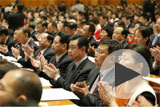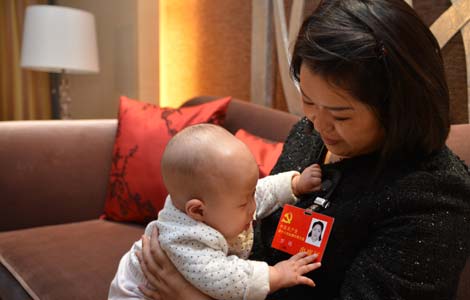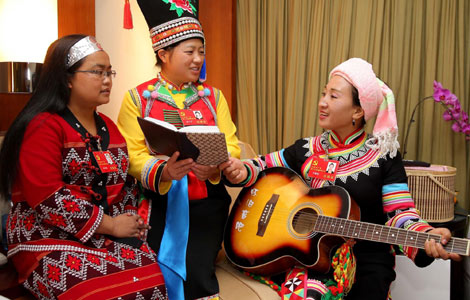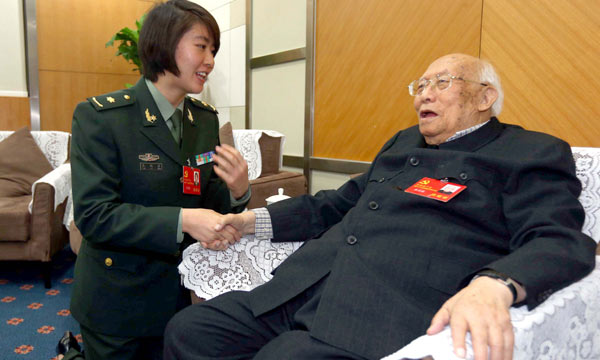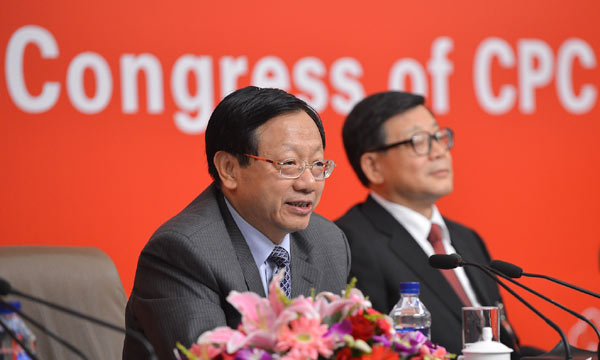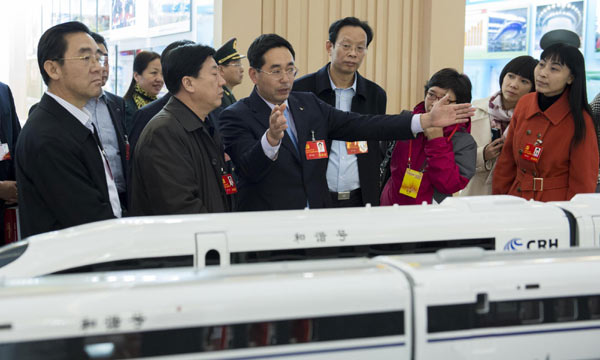CPC elects younger,grassroot delegates to congress
(Xinhua)
Updated: 2012-11-05 09:40
 |
|
Wang Jingqing (C), deputy head of the Organization Department of the Communist Party of China (CPC) Central Committee, attends a press conference in Beijing, capital of China, Aug 14, 2012. The 2,270 delegates, elected by 40 electoral units, will represent more than 82 million CPC members in attending the 18th CPC National Congress, which is scheduled to be held in the second half of this year in Beijing.[Photo/Xinhua] |
BEIJING - An Olympic gold medalist, migrant workers and rural doctors are with top Chinese leaders to represent 82 million members of the Communist Party of China (CPC) at the upcoming national congress.
The CPC has elected younger and more grassroots-level delegates to attend its upcoming 18th national congress, said Wang Jingqing, deputy head of the Organization Department of the CPC Central Committee, at a press conference Tuesday.
About 30.5 percent of the elected delegates are from the grassroots level, up 2.1 percentage points from the previous congress in 2007, Wang said.
Party members who joined the CPC after the reform and opening-up in the late 1970s constitute the majority of delegates, Wang said.
A total of 1,640 delegates joined the Party after November 1976, accounting for 72.2 percent of the total, 20.5 percentage points higher than that of the congress in 2007, he said.
The average age of the delegates is 52, and 64.8 percent of the delegates are under age 55, Wang said.
There are 114 delegates under 35, accounting for 5 percent of the total, 1.9 percentage points higher than the previous congress.
The youngest delegate is Jiao Liuyang, the London Olympics swimming champion in the women's 200m butterfly event. She was born in March 1990 and joined the Party in 2008.
The oldest is former mayor of Beijing Jiao Ruoyu, who was born in December 1915 and joined the CPC in 1936. The two are not related.
"The wide age span shows that the CPC's cause has been passed from the older generation to the younger generation and maintained its dynamics," Wang said.
Among all the delegates to the congress, the number of workers saw the sharpest increase, from 51 in the 17th congress to the current 169, including 26 migrant workers.
They work in a variety of factories in the industrial sector, such as as mining, steel and machinery factories, and they hold a variety of positions in the service sector, including those involved in transport, utilities, sanitation, financial business and trade.
Also, grassroots delegates include rural teachers, village doctors, farmers as well as village Party officials.
Female delegates account for 23 percent of the total and ethnic minorities account for 11 percent.
According to established practices, the CPC Central Committee will also invite some Party members who have retired from their leadership posts as special delegates to the congress, Wang said.
"The makeup of delegates is appropriate and all ratios set by the CPC Central Committee to realize full representativeness have been fulfilled," he said.
The 2,270 delegates, elected by 40 electoral units, will represent more than 82 million CPC members in attending the 18th CPC National Congress, which is scheduled to be held in the second half of this year in Beijing.
According to the criteria set by the CPC Central Committee, delegates to the national congress should have firm faith and a correct political stance. They should also be morally upright, excellent at their work and qualified for their duties, Wang said.
INTRA-PARTY DEMOCRACY
To ensure the election of more outstanding delegates, the CPC has, for the first time, carried out a multi-candidate survey on the preliminary candidates of the delegates to the upcoming Party congress.
The loss margins in electing delegates to the 18th CPC National Congress were raised to 15 percent or above nationwide, according to the Organization Department of the CPC Central Committee.
Some local Party committees have, for the first time, publicized the list of delegates' names via media channels, in a bid to mobilize the participation of, and solicit feedback from, Party members in the election.
The election process was "open and transparent," with each Party member having access to election information. Up to 98 percent of Party members participated in the election of delegates to the Party congress, according to Deng Shengming, spokesman for the Organization Department of the CPC Central Committee.
CPC members participated and supervised the election through party member meetings, published notices and text messages sent to their cell phones, Deng said, adding that the media have covered the whole process of the election.
"The party also solicited opinions from members who could not be attached to a certain party unit, as well as retired or ailing members, via phone calls, emails and visits," Deng said.
He added: "It is also the first time we held a press conference here to introduce the election of delegates."
During the press conference, Wang Jingqing said the CPC would continue its efforts to promote intra-Party democracy by ensuring Party members' rights to know and supervise, improving the Party congress system and promoting intra-Party elections and supervision.
Wang said that the CPC Central Committee imposed strict disciplines on the election to ensure a sound and healthy process and banned bribery and pulling strings to draw votes.
Discipline agencies, organizing departments as well as the electoral units closely monitored the process of the election. The CPC Central Commission for Discipline Inspection and the Organization Department of the CPC Central Committee sent inspectors to supervise and check the elections at the local level.
According to a survey by the Organization Department of the CPC Central Committee, about 97 percent of the Party members were satisfied with the election, Wang said.
Related Stories
CPC to convene 18th National Congress on Nov. 8
2012-09-28 18:17CPC to hold 18th national congress in 2012 2011-10-18 20:12
Video
